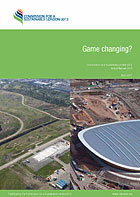Most popular

Annual Review 2010
April 2011
March 2013
Tags:
This is the final report of the Commission for a Sustainable London 2012 (CSL).
Our post-Games report concluded that London 2012 has been the most sustainable Games ever but we have always looked for more. The work of the Commission over the past seven years has been centred on the idea put forward by our longest serving Commissioner, Dr Robin Stott. Robin maintains, correctly, that there is no such thing as a sustainable Olympic and Paralympic Games unless it is possible to demonstrate in some way that the resources used to stage the Games are in some way compensated for by more sustainable practices inspired by, or as a direct result of the Games.
This final report attempts to gather evidence to understand if this has been achieved or if enough has been done to date to ensure it will be achieved in the future. On balance we believe there is sufficient evidence to conclude that sustainable practices inspired by London 2012 should out-weigh the inevitable negative impacts of the Games over time.
As early as 2008, the Commission recommended that a learning legacy be established to enable London 2012 to make a difference to the sustainability agenda. Despite some difficulties along the way, the Olympic Delivery Authority (ODA) and the London Organising Committee of the Olympic and Paralympic Games (LOCOG) have both produced an excellent suite of learning legacy material. We congratulate them for this achievement. In the construction sector we can see evidence that some very large projects around the world are adopting similar standards and approaches to the ODA and that London 2012 is recognised globally for best practice in sustainable construction. However, other than the notable exception of the Queen Elizabeth Olympic Park transformation work, there is little evidence of this in small to medium sized projects. Scepticism about the business case, inconsistent approaches to planning, lack of leadership and lack of competence in the supply chain are cited as barriers. We can see some evidence of these issues being tackled but there remains much to do.
The event management sector has two new standards for sustainability management inspired by London 2012 and there is evidence of increasing use of these standards by event organisers and venue owners alike. This progress could be accelerated if more clients of events demanded higher standards, particularly the public sector. There is also evidence of the London 2012 Food Vision and waste strategy being adopted although few have set such ambitious targets. Sustainability is driven by context and Olympic and Paralympic Games taking place in different parts of the world will have a different context and a therefore will have a different approach to sustainability. A good example of this is Rio 2016, the project team has demonstrated that they have learned a lot from London 2012 and will apply those lessons well in the context of their own Games. The culture of North America is more closely aligned to the UK and we are pleased to see the 34th America’s Cup event adopting most of LOCOG’s standards and in some cases setting even higher goals. The same cannot be said for the Glasgow 2014 Commonwealth Games where targets are less ambitious or less specific. Food, waste and supply chain strategies have yet to be announced and are being left much closer to Games-time than LOCOG, which could render them ineffective.
We have seen various iterations of legacy organisations over time and we are pleased to see that the latest version, the LLDC (London Legacy Development Corporation) has done much better than its predecessors by taking the best practice developed by the ODA and LOCOG and raising the bar even higher. This, coupled with success in developing legacy plans for all the key venues, should help to stimulate a strong social, economic and environmental legacy for East London. At a national level, the establishment of a Cabinet Office team led by Lord Coe provides a focus on key issues across the UK.
The picture for broader legacy is much more optimistic but there remain issues such as the failure of Government to implement higher standards of sustainability through procurement. Despite significant efforts by LOCOG, issues of corporate ethics with sponsors and in the supply chain for merchandise were not fully resolved and remain a problem for major events generally. To this end, we welcome the initiative by the Institute of Human Rights and Business to engage a working group to develop some longer term solutions. This group was not formally constituted at the time of writing this report but we wish the initiative well.
The model developed to provide assurance that gave rise to the Commission was also unique and ground-breaking. An independent evaluation of the Commission’s work has been broadly positive and key stakeholders agree they received a valuable service. There is some evidence of a similar model being adopted in the private sector by a global corporation and by major projects outside the UK. In the UK public sector we can find no such evidence. The GLA requested that the independent evaluation be undertaken to establish lessons learnt from the Commission’s role and in light of it being the first independent sustainability assurance function for an Olympic or Paralympic Games. As part of reviewing the question of whether London could or should have an independent assurance function established for its major projects, the evaluation will provide new insights into what has worked any why. However, at present there are no plans to replicate the model for the Olympic and Paralympic legacy or any other London project or function, the same is true nationally. London 2012 has made a difference to sustainability but there remains plenty of opportunity to further capitalise on the learning legacy from the Games.